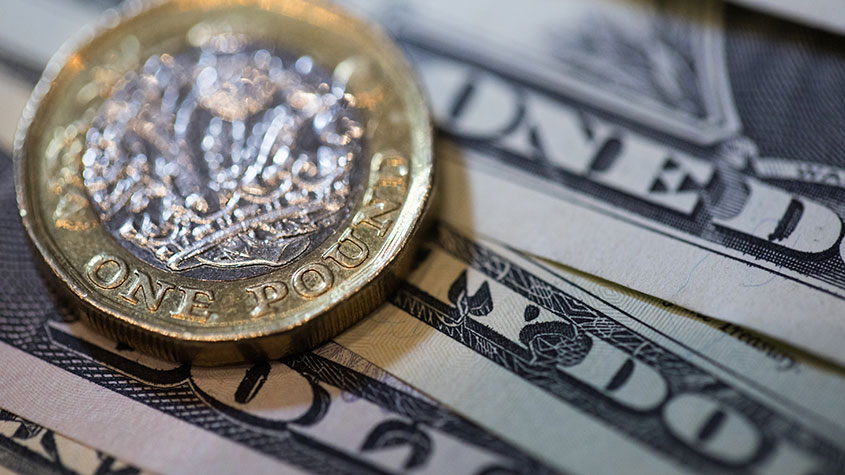Why a strong dollar hurts – and what you can do about it
The US dollar is at its strongest level in 20 years. That’s bad news for most investment assets, says John Stepek – here’s why


Get the latest financial news, insights and expert analysis from our award-winning MoneyWeek team, to help you understand what really matters when it comes to your finances.
You are now subscribed
Your newsletter sign-up was successful
Want to add more newsletters?

Twice daily
MoneyWeek
Get the latest financial news, insights and expert analysis from our award-winning MoneyWeek team, to help you understand what really matters when it comes to your finances.

Four times a week
Look After My Bills
Sign up to our free money-saving newsletter, filled with the latest news and expert advice to help you find the best tips and deals for managing your bills. Start saving today!
Last week, the US dollar hit its highest level in nearly 20 years by one popular measure. The US dollar index looks at the value of the US dollar against a basket of six other major currencies. The euro carries by far the biggest weight at more than half of the basket, with the rest comprising (in order of size) the Japanese yen, the pound, the Canadian dollar, the Swedish krona and the Swiss franc. The index started life in 1973, just after the US left the gold standard, with a value of 100. It’s had plenty of highs and lows since – it hit its all-time low in 2008, at just above 70, while its high came in 1984, at almost 165.
It is now sitting around 106. That may not sound dramatic, but it’s the highest since November 2002, and the move has been rapid – the dollar is up by nearly 10% against the euro this year alone, and an extraordinary near-20% against the yen. Why does this matter? The dollar is the global reserve currency; it dominates global trade and central banks around the world have it at the core of their reserves. Put simply, everyone needs dollars. So when the price of a dollar is going up relative to everything else – as it is now – that effectively means liquidity is getting tighter across the globe, not just in the US. This is at least one reason why markets everywhere are struggling.
Why is the dollar so strong?
Given that most countries are by now raising interest rates and tightening monetary policy (which typically results in stronger currencies), why has the dollar raced so far ahead? Its strength has a pretty straightforward explanation, says liquidity expert CrossBorder Capital: the US is tightening monetary policy more aggressively than everyone else – “quantitative tightening” by the Federal Reserve “is outpacing all other major central banks”. On top of that, you have a feedback loop whereby a stronger dollar hurts risky assets, which scares investors, who then run for the perceived safety of the dollar, driving it higher again.
MoneyWeek
Subscribe to MoneyWeek today and get your first six magazine issues absolutely FREE

Sign up to Money Morning
Don't miss the latest investment and personal finances news, market analysis, plus money-saving tips with our free twice-daily newsletter
Don't miss the latest investment and personal finances news, market analysis, plus money-saving tips with our free twice-daily newsletter
What does this mean for your money? There is little point trying to time currency markets and they certainly shouldn’t be your priority when thinking about asset allocation (if you’re a sterling investor with a well-diversified portfolio, you probably have plenty of dollar exposure anyway).
But it might be worth looking for longer-term opportunities. Take emerging markets. As Ruchir Sharma notes in the Financial Times, most are in far better shape now than during previous dollar-driven crises. Indeed, “the share of countries suffering rapid inflation (above 5%) is higher in developed markets than in emerging markets”. Overseas investors have fled India at record rates, reports Goldman Sachs. One option to consider is the Aberdeen New India (LSE: ANII) investment trust, on an unusually high discount of 18%.
I wish I knew what PPP was, but I’m too embarrassed to ask
Purchasing power parity (PPP) is a theory that tries to work out how over- or undervalued one currency is relative to another. It does this by comparing the price of identical goods in different economies. The idea is that a similar basket of goods should cost roughly the same wherever you go.
Why? Because if goods are cheaper in one country than in another, then that country should be able to export them to the other for a profit. In turn, those sales would boost demand for the exporter’s currency, driving the exchange rate higher, and eliminating the difference between the two. As a result, purchasing power between countries should tend towards parity in the long run.
The best-known PPP currency indicator is the “Big Mac index”, published by The Economist since 1986. It shows the value of a McDonald’s Big Mac burger in US dollars, all across the globe. Clearly the index is not especially scientific, but as a Big Mac is a product that can be bought in almost any country in the world and is comprised of the same input costs (raw materials and labour) and is distributed in almost exactly the same way wherever you go, it’s as good an approximation as you’ll get.
As of early January 2022, the index had a Big Mac costing £3.59 in the UK and $5.81 in the US. At the prevailing exchange rate at the time of $1.34 to the pound, that meant a Big Mac in the UK cost just over $4.80, suggesting the dollar was about 20% overvalued relative to the pound.
PPP is useless as a trading tool – like most other assets, currencies can stay out of line with their “fundamental” valuation for far longer than seems sustainable. However, using PPP to adjust GDP figures can be a useful way for economists to compare GDP between nations without the distorting impact of relative currency valuations, which can make living costs look higher in developing countries than they really are.
Get the latest financial news, insights and expert analysis from our award-winning MoneyWeek team, to help you understand what really matters when it comes to your finances.

-
 Should you buy an active ETF?
Should you buy an active ETF?ETFs are often mischaracterised as passive products, but they can be a convenient way to add active management to your portfolio
-
 Power up your pension before 5 April – easy ways to save before the tax year end
Power up your pension before 5 April – easy ways to save before the tax year endWith the end of the tax year looming, pension savers currently have a window to review and maximise what’s going into their retirement funds – we look at how
-
 The challenge with currency hedging
The challenge with currency hedgingA weaker dollar will make currency hedges more appealing, but volatile rates may complicate the results
-
 It's time to back the yen, says Dominic Frisby
It's time to back the yen, says Dominic FrisbyThe Japanese yen has been weak for a long time, says Dominic Frisby. That may soon change.
-
 Why you should keep an eye on the US dollar, the most important price in the world
Why you should keep an eye on the US dollar, the most important price in the worldAdvice The US dollar is the most important asset in the world, dictating the prices of vital commodities. Where it goes next will determine the outlook for the global economy says Dominic Frisby.
-
 What is FX trading?
What is FX trading?What is FX trading and can you make money from it? We explain how foreign exchange trading works and the risks
-
 The Burberry share price looks like a good bet
The Burberry share price looks like a good betTips The Burberry share price could be on the verge of a major upswing as the firm’s profits return to growth.
-
 Sterling accelerates its recovery after chancellor’s U-turn on taxes
Sterling accelerates its recovery after chancellor’s U-turn on taxesNews The pound has recovered after Kwasi Kwarteng U-turned on abolishing the top rate of income tax. Saloni Sardana explains what's going on..
-
 Why you should short this satellite broadband company
Why you should short this satellite broadband companyTips With an ill-considered business plan, satellite broadband company AST SpaceMobile is doomed to failure, says Matthew Partridge. Here's how to short the stock.
-
 It’s time to sell this stock
It’s time to sell this stockTips Digital Realty’s data-storage business model is moribund, consumed by the rise of cloud computing. Here's how you could short the shares, says Matthew Partridge.